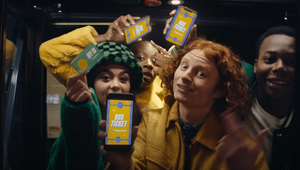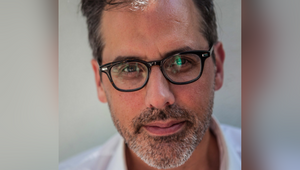
LBB Film Club: Youth

Youth is the short film debut of Chief’s director and photographer Olivier Richomme - a striking and impactful piece of work delving into the thoughts, hopes, fears and dreams of young people on the cusp of adulthood. In his own words, Youth is less looking for answers, but more so aiming to ask the all-encompassing questions that torment people in their early adulthood - from death to love.
Youth has no reference to time or place. All of its characters are dressed ambiguously and its approach is timeless, with a universal visual language. And although by no means a marker of time, the costumes given to the characters are a nod to their premature entrance into adulthood or a metaphor for their unease of the step they’re meant to take. Shot on Super 16mm film, by cinematographer Sean Lomax, the film serves as an ode to the young, an allegory, and a poem.
These themes are not new for Olivier - as a keen storyteller, he finds smaller details that define the human experience and amplifies them to highlight the story within. His style, always lined with honesty, allows him to seamlessly move through genres.
LBB’s Zoe Antonov spoke to Olivier about how he developed the characters in Youth, their endless yearning for knowledge and what it was like to realise a pandemic-born film.
Youth // Dir Olivier Richomme from CHIEF. on Vimeo.
LBB> What was the initial idea for the film and what did your storyboards look like?
Olivier> The idea for the film came in the midst of the pandemic. I kept thinking about how precious that time is between childhood and adulthood and how difficult it probably was to navigate through those strange days and figure out what to do. It felt as though young people were being forced to be old and their youth was being cut short. So to put today’s young people in an ageless nostalgia tinged world felt like a good metaphor to begin with. I’m also a father and I’m very interested in understanding the perspective of young people. As you grow older it’s increasingly difficult to keep that connection with what I believe to be that instinctive wisdom of youth. So I was very keen to explore that.
LBB> Where did you take inspiration from and how long did the idea brew in your mind?
Olivier> I come from the world of photography and I was very drawn to some of the work by Charlotte James and Bex Day. But ultimately it was a self driven need to enquire and understand this world that was becoming increasingly mysterious to me.
LBB> What did you consider when you were constructing the general vibe and creative direction of the film?
Olivier> The film is timeless - but how did you pick the outfits and the locations? What were your considerations when doing that?
Since moving to the UK in the early 2000s I’ve always been fascinated by forgotten and abandoned places. I think because the past here is something I don’t quite understand, I find decayed places filled with history really evocative. Bingo halls are really exotic to me. There was never anything remotely like it when I grew up in Marseille, France. I’m also a huge admirer of brutalist architecture, old houses and kitsch. So all those things were very much on the cards as soon as I started thinking about the film. Beyond that I worked very closely with a hugely talented stylist Vicky Olschak and thought up outfits and characters that would fit the different locations.
LBB> What role does sound play in the film? How did you choose the track to play in the background?
Olivier> I spent a lot of time finding the right track. I tried lots of different options but none of them felt quite right. One sunny Sunday morning whilst drinking coffee, Emahoy Tsegué-Maryam Guèbrou’s Homeless Wanderer track came on and all of a sudden all the images of the film came rushing in so it felt like the right choice. It so happens that the artist passed away very shortly after the film was finished and her family agreed to let me use the music for the film which felt like a great honour.
LBB> Why did you decide that an interview-type format would be best fitted for the film? And how was the script for those interviews written?
Olivier> As soon as the project began I knew that I was making some kind of hybrid documentary. The visuals had to be abstract while the voice over was the link to reality. So, very early on in the casting process I knew that I would be conducting interviews with the cast. I wrote a series of leading questions, some of them a little unclear and always very open ended and visited each cast in their home after we shot the main photography. We sat down for a sometimes lengthy conversation and what you hear on the film is the result of that.
LBB> What are some themes that come up repeatedly through the film and why?
Olivier> What became apparent when talking to all these young people is that their impressions and hopes of the future weren’t particularly positive. But it was always about the big B-road themes like global warming, the economy, the cost of living… And yet when talking about their daily life, very often they were very hopeful, they had dreams, they had love. And that disconnect felt very much led by what I guess you would say the news cycle, most likely social media, the outside world was presenting to them. When in reality their real life experience wasn’t all that bad and they experienced genuine moments of joy, care, acceptance, hope. I also found a lot of wisdom for such young people. It’s remarkable to see how much your view of the world is very much established from a young age.
LBB> What do you hope for audiences to take away from the film?
Olivier> I’m not sure. I played the film to my 12-year-old son for the first time recently and it seemed to resonate with him deeply. Beyond that I’m not sure.
LBB> You say you weren't looking for answers within the film, but more so making sure the questions have been asked. What do you believe the importance of asking the question is and how do you make sure young people feel represented in the questions you asked?
Olivier> I think offering a platform to those young people to discuss their hopes, their fears, their dreams, their vision of the future, what they think happens to us when we die, if they have ever loved… All those things are bubbling under the surface and it felt like all of them were very open to discuss them.
LBB> Tell me about the colour palette of the film and why did you go for that particular one?
Olivier> Each scene is a vignette, a tableau, and has a very distinctive look. It wasn’t a deliberate choice to create a certain colour palette. It was more about the different types of textures and the type of places. The bingo hall, the old social club, the brutalist building, the dance hall. I find all those places really evocative for very different reasons. They all conjure up a sense of nostalgia and dream, an echo from another time that I find incredibly exciting.
LBB> Why did you believe that shooting on film was the best course? What was the process like?
Olivier> From the very beginning that was an imperative choice. To create that timeless feeling, that link to the past, that ageless look, it had to be made with something organic rather than pixels.
LBB> What was the most difficult part of shooting? And similarly, what was most fun?
Olivier> Genuinely it was just a joy to make. I feel very grateful and lucky to have worked with very talented people who all brought their skills to create art. Can’t get any better than that really.













